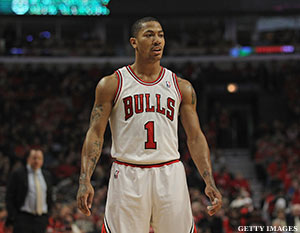
The NBA's so-called "new breed" of point guard, ushered in by the likes of Derrick Rose, Russell Westbrook and John Wall, has raised questions about what really makes a point guard.
It's not an easy question to answer. That's why we use terms like "lead guard," "primary ball handler" and the easy catch-all, "combo guard."
There's Shakespeare's famous quote from Twelfth Night that says "some are born great, some achieve greatness, and some have greatness thrust upon 'em."
It's not hard to see how that can apply to being a point guard in the NBA, and it may help to better understand why so much uncertainty revolves around the true definition of the position.
Those That Are Born With It
Not everyone is John Stockton, Mark Jackson or Steve Nash. There have been all kinds of players in the league who have unquestionably been point guards. Magic Johnson was built like a power forward, but he famously pushed the tempo for the great Lake Show offense. Isaiah Thomas was one of the league's best scorers, but he was also a great distributor and floor-leader.
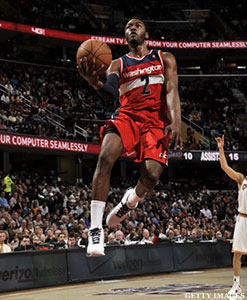
"It really just depends on the other personnel of that team," said Dustin Gray, founder of the training company Empower Basketball. "The Suns last year, for example, had guys that shot well from the perimeter and they liked to spread the court, which is what they already wanted to do with Nash."
Those in the aforementioned "new breed?" Some are scorers much more than passers, but they fit the point guard mold in the sense that they're naturals at controlling the tempo, seeing the defense, and leading a team on the floor. They've likely been the point guard since junior high. Rose, Wall, Brandon Jennings, Ty Lawson, Darren Collison, Kyrie Irving, Kemba Walker and Brandon Knight, to name a few, have all been unquestioned as point guards despite their scoring-minded play.
In fact, pass-first point guards have become extremely rare in the past five drafts, especially the lottery, leading up to this year.
In 2007, the closest thing was Mike Conley. In '08, D.J. Augustin. No true distributors in 2010 or 2011. That's why 2009, and Ricky Rubio, was such a big deal. The Spaniard's dynamic passing was such a rare skill, it led to him being taken No. 5 overall, even though scouts were unsure if any other skills would transfer to the next level.
But these natural-born floor generals are far from the only guys who have been drafted by teams thinking, or hoping, they were picking a point guard.
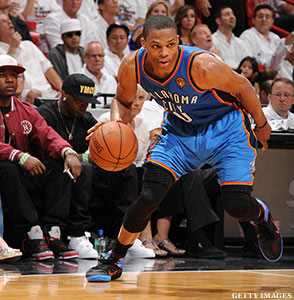
Those That Achieve It
This next group includes players with question marks about their position.
Two guys taken in the 2008 class, O.J. Mayo and Westbrook, have been labeled as combo guards at some
point.
"Probably the hardest thing for some of those guys, undersized for twos, transitioning to playing the one, is the difference in mentality," Gray said. "They've had a scoring mentality, as opposed to a playmaking mentality."
Mayo got the designation because he was a bit undersized for the two, had a good handle and basketball IQ. Ultimately, he was only forced to play the point as a backup to Conley, and was free to score, his more natural role, on a regular basis.
Westbrook, on the other hand, has been a point guard since Day 1, mostly because he was the Thunder's only option. While he's found great success, critics still question his natural position. He often gets compared to Rose because he's an athletic scorer. But he's criticized for not distributing because he plays with Kevin Durant, and Rose doesn't. But Durant is still getting 30 a night, and the Thunder win games.
Perhaps the best example is probably Stephen Curry, because he played primarily off the ball in college and switched to being a point guard as a pro. And it worked.
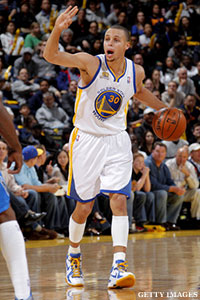
Curry put up big numbers at little Davidson with "true point guard" Jason Richards racking up assists. He had the ball in his hands even more after Richards graduated, but teams were still unsure if Curry was a one or a two. Despite injuries, he's proven to be a natural at scoring and distributing in Golden State's up-tempo offense.
"The one thing about Steph is, he's a smart player," Gray said. "He's really improved, but he's still more
of a score-first kind of point guard. The biggest thing is that he had a really good sense of the game and
the pace before he tried to transition."
Those That Have It Forced Upon 'Em
And then there's Tyreke Evans. The guy's truly a beast. He's a scorer and he's a bull going to the rim. John Calipari used him as a point guard at Memphis, and it worked because he was always the best player on the court by far.
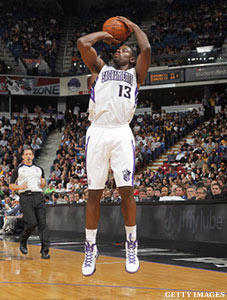
In his rookie year with the Kings, he put up strong numbers, but it's gotten worse since then. Unable to include talents like DeMarcus Cousins and Marcus Thornton in the offense, he was finally moved to small forward. They didn't need him to be Jason Kidd, but he couldn't play the point with blinders on.
Gray hasn't worked with Evans, but he said the issue for some guys that fail to make the transition is the feel for the game it takes to be a point guard.
"When you're not playing the point guard, you don't necessarily have to know what the other four guys
are doing," he said. "You don't need to be able to read the defense."
The New Class
So what does that mean about the 2012 group? With fewer and fewer "natural" point guards available, teams are being forced to get creative.
Damian Lillard, Kendall Marshall and Marquis Teague probably fit in the first group. They won't even be tried out anywhere but the point. Lillard will likely start there from Day 1, and Marshall appears to have it in his blood.
But there are others who will be worked out at the point. Jared Cunningham is a big guard who will get time running the offense. The baffling Tony Wroten should also stick there. He's probably the second most gifted passer behind Marshall, but it's unclear whether he wants to show off that skill.
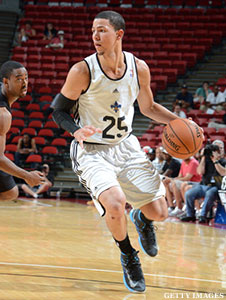
Smaller shooting guards Bradley Beal and Dion Waiters look to be out of the woods because they play next to established point guards.
The most curious case is Austin Rivers. He was getting very little consideration as a point guard coming into the draft, but he appears to have fallen into the trap of being the second best guard on a team that needs a point guard. Despite racking up more turnovers than assists in his year at Duke, and appearing to have no interest in doing anything but scoring, the Hornets are asking Rivers to take control of an offense that hopes to feature Eric Gordon and No. 1-pick-and-surefire-superstar Anthony Davis. It's a big gamble, but unless Muggsy Bogues decides to come out of retirement, it might have to work.
"Austin Rivers might be able to pick it up quicker," Gray said. "I mean, right now he's a 100 percent score-first kind of guy, but he's been around the NBA game his whole life. He might be able to pick it up."
Even if it wasn't what he was born to do.




